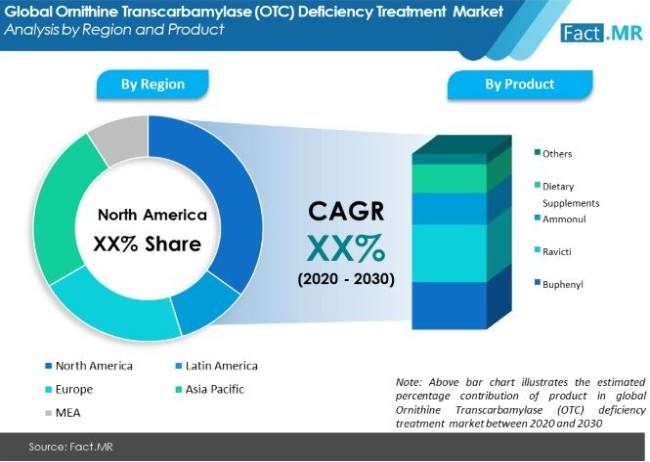Genetic disorders have been highly prevalent since the past several years. Amongst all the genetic anomalies known to humankind, urea cycle disorders (UCDs) and ornithine transcarbamylase (OTC) deficiency are highly prevalent around the world.
OTC deficiency is inherited in an X-linked recessive manner – males are more commonly affected as compared to females. The prevalence of OTC deficiency is estimated to range from 1 in 14,000 to 77,000 people. Therefore, healthcare providers have been ramping up their R&D capacities to discover potential cures.
Surge in the number of patients suffering from this deficiency is likely fuel the global ornithine transcarbamylase (OTC) deficiency treatment market. According to Fact.MR’s estimates, the global OTC deficiency treatment market will more ever closer to billion dollar mark by 2030, expanding at a steady CAGR throughout the 2020-2030 forecast period.
“Conferment of orphan drug status by regulatory bodies is motivating manufacturers to accelerate development of novel OTC deficiency treatment formulations,” infers a Fact.MR analyst.
Global Ornithine Transcarbamylase Deficiency Treatment Market: Segmentation
Product
- Buphenyl
- Ravicti
- Ammonul
- Dietary Supplements
- Others
Route of Administration
- Oral
- Intravenous
Distribution Channel
- Hospital Pharmacies
- Retail Pharmacies
- Online Pharmacies
Share Your Requirements & Get Customized Reports – https://www.factmr.com/connectus/sample?flag=RC&rep_id=5204

Key Takeaways from OTC Deficiency Treatment Market Report
- North America is slated to dominate the global ornithine transcarbamylase deficiency treatment market, with Asia Pacific is following closely.
- By product, Ravicti OCT deficiency treatment drugs are likely to pivot market growth.
- Orally administrable drugs will enjoy high popularity, owing to ease of ingestion and minimal trauma.
- Hospital pharmacies will be the primary point-of-sale for OCT deficiency treatment drugs.
- The threat of COVID-19 infection and fatality increases for patients suffering from other co-morbidities, heightening the need for innovation in vaccines, which is giving imputes to the growth of the ornithine transcarbamylase deficiency treatment market.
Following Questions Answers Covered in the Report are:
- How will the global Ornithine Transcarbamylase Deficiency Treatment Market perform during the forecast period? What will be the market size in terms of value and volume?
- Which segment will drive the global Ornithine Transcarbamylase Deficiency Treatment Market? Which regional market will show extensive growth in the future? What are the reasons?
- How will the market dynamics change because of the impact of future market opportunities, restraints, and drivers?
- What are the key strategies adopted by players to sustain themselves in the global Ornithine Transcarbamylase Deficiency Treatment Market?
- How will these strategies influence the market growth and competition?
Access Research Methodology Prepared By Experts – https://www.factmr.com/connectus/sample?flag=RM&rep_id=5204
Regional analysis includes
- North America (U.S., Canada)
- Latin America (Brazil, Mexico, Argentina, Chile, Peru, Rest of LATAM)
- EU – (Germany, France, Italy, Spain), UK, BENELUX (Belgium, Netherlands, Luxemburg), NORDIC (Norway, Denmark, Iceland, Sweden), Eastern Europe (Poland, Ukraine, Czech Rep. etc.), Rest of Europe
- CIS & Russia
- Japan
- Asia Pacific Excluding Japan (Greater China, India, S. Korea, ASEAN Countries, Rest of APEJ)
- Middle East and Africa (GCC Countries, Turkey, Iran, Israel, South Africa , Rest of MEA)
Competition Analysis
The global ornithine transcarbamylase deficiency treatment market is interspersed with the presence of several renowned pharmaceutical companies. Product launches, acquisitions, and strategic collaborations form a part and parcel of prominent players’ key consolidation strategies.
- In February 2010, Abbott Laboratories acquired Solvay S.A for US$ 6.2 billion. This led to the company’s pharmaceutical products portfolio expansion and presence in key emerging markets.
- In 2017, Mead Johnson Nutrition entered a merger agreement with Reckitt Benckiser, thereby allowing the company to market its nutrition enhancing products on a much wider scale by tapping into a much larger customer base. Some of its products include Enfamil®, Enfagrow®, and Choco Milk®, among others.
- With respect to product development, Arcturus Technologies is working on multiple OTC deficiency treatment drugs. It currently markets LUNAR® delivery based Messenger RNA (mRNA) infused medicines to treat protein deficiency diseases such as UCDs.
About Us:
Market research and consulting agency with a difference! That’s why 80% of Fortune 1,000 companies trust us for making their most critical decisions. While our experienced consultants employ the latest technologies to extract hard-to-find insights, we believe our USP is the trust clients have on our expertise. Spanning a wide range – from automotive & industry 4.0 to healthcare & retail, our coverage is expansive, but we ensure even the most niche categories are analyzed. Our sales offices in United States and Dublin, Ireland. Headquarter based in Dubai, UAE. Reach out to us with your goals, and we’ll be an able research partner.
Contact:
11140 Rockville Pike
Suite 400
Rockville, MD 20852
United States
Tel: +1 (628) 251-1583
Jumeirah Lakes Towers,